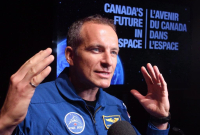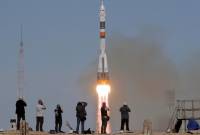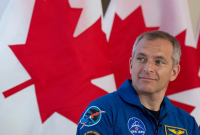Support strong Canadian climate journalism for 2025
Canadian astronaut David Saint-Jacques blasted through the skies over Kazakhstan early Monday in what appeared to be a seamless launch of a Russian Soyuz rocket bound for the International Space Station.
The 48-year-old doctor and astronaut lifted off from the Baikonur Cosmodrome with Anne McClain of NASA and Oleg Kononenko of the Russian space agency, Roscosmos.
The launch of the Soyuz MS-11 spacecraft appeared to go exactly as planned at the precise liftoff time of 6:31 a.m. Eastern.
"We have liftoff," a commentator said on NASA television as the rocket roared into the sky under 930 pounds of thrust and a speed of 1,770 kilometres per hour. "Everything looking good, vehicle is stable — good first stage performance."
The crew reported that all went well in those critical initial minutes after liftoff and were safely in orbit.
Back on Canadian soil, a crowd monitored the launch from the Canadian Space Agency in Longueuil, Que., as the rocket began its roughly six-hour transit to the space station.
Innovation Minister Navdeep Bains praised the successful takeoff and said the mission offers an exciting opportunity for scientific research and developments that could have broad applications, in such things as robotics and aging.
"Space represents a lot of opportunities for a lot of Canadians," he said at the agency office. "It really is inspirational what David represents...today is an incredible day in space."
Astronaut Jenni Sidey-Gibbons echoed the message, saying Saint-Jacques was a special role model for her and other young people who may be considering a future in space.
"That was particularly important for me when I was growing up and I certainly wouldn't be where I am today if it wasn't for Canada's early space program and, kind of, the heroes that pushed that forward," she said. "It's incredible."
It was the first manned Russian rocket launch since a dramatic aborted Soyuz failure in October.
On Oct. 11, a rocket failure forced a Soyuz capsule carrying two astronauts to abort and make an emergency landing.
Russia suspended all manned space launches pending an investigation before giving the green light Nov. 1.
Saint-Jacques has spent years training for the six-month mission, which was originally scheduled for Dec. 20 but was moved up after the aborted Soyuz launch.
Aboard the station, he will conduct a number of science experiments, with some focusing on the physical effects of the weak gravity astronauts experience in orbit as well as how to provide remote medical care.
Former astronaut Robert Thirsk said the schedule will be especially busy for the trio.
"Every five-minute increment of our life is scheduled, and that will be the same for David also," he said at the space agency office. "The challenge for him will be to pace himself to accomplish the work that's expected of him."
It was expected the crowd on the ground watching the liftoff in Kazakhstan would include members of Saint-Jacques' family as well as Gov. Gen. Julie Payette, herself a former astronaut.
Payette, who completed missions to the space station in 1999 and 2009, had said the most dangerous moments come immediately following the launch as the rocket passes through several "critical zones" on its way into space.
The last Canadian astronaut to visit the space station was Chris Hadfield, who was on a five-month mission that ended in May 2013.





Comments